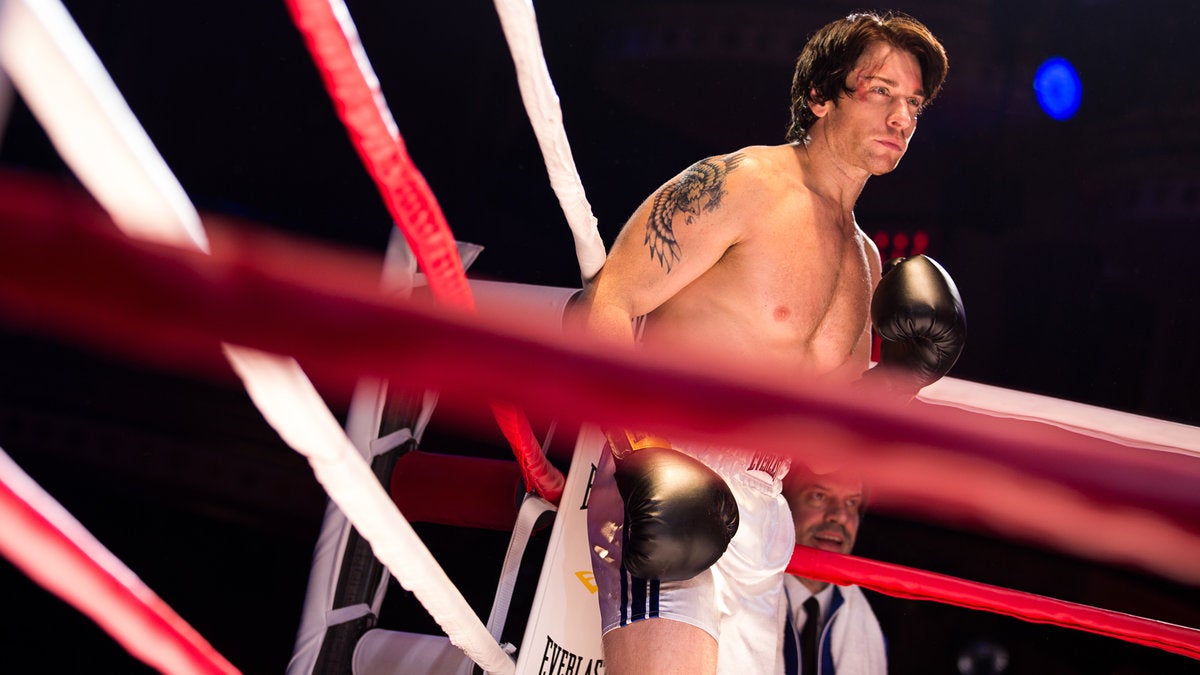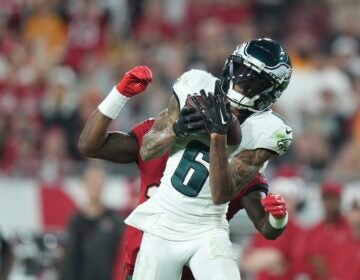Review: Broadway’s ‘Rocky,’ but still Philly’s fighter

Andy Karl as Rocky in the new Broadway musical version of the film, which opened Thursday night. (Photograph courtesy of Matthew Murphy)
Can a bum from the neighborhood ever be anything more?
You sense the underlying sadness right away. It gave the original “Rocky” movie a quiet vulnerability, and it does the same for the new musical version of “Rocky” that opened Thursday night on Broadway. Can a bum from the neighborhood ever be anything more?
Well, you know the answer, at least for Rocky, the low-grade amateur boxer who ends up going the distance against the world champ at the Spectrum on New Year’s Day, 1976. Everyone knows the answer – Sylvester Stallone’s tale of a Philly underdog is by now as indelible a part of international culture as the tale of Romeo and Juliet. And possibly more appreciated – Rocky ends not in tragedy, but in what settles for triumph.
Like Rocky himself, the new musical manages to overcome its very visible flaws. It ends up making you feel good all over, just like the film, the highest grossing of the Bicentennial year, in which it opened and won the best-picture Oscar. The show trumps the movie in one big way – the live action ending is remarkable, with fight choreography by Steven Hoggett that’s beautifully theatrical whenever it isn’t looking like a real boxing match, also staged to perfection. As the big fight unfolds in front of you, the blood spurts, the sweat drips, the eyes of Rocky and his opponent puff up. The pageantry of the ring grips you, and so does its cruelty. (I suggest ringside seats in the center block of the Winter Garden’s Row G, if you can get them.)
But mostly you’re elated, because “Rocky” evolves into terrific fun despite itself. “Rocky” has ho-hum, repetitive music in the first half and in the second, tunes strain under the weight of their melodramatic swells in a score by Stephen Flaherty and Lynn Ahrens. The show unfolds with a just-OK book by Stallone (a producer and the power behind the film and this show) and Thomas Meehan, who wrote the scripts for such musical hits as “Annie,” “The Producers” and “Hairspray.”
In a sense, Stallone and Meehan do “Rocky” a big favor by leaving him alone, except for an overdose of his aw-shucks, battered self-esteem. The two writers stick close to the film, as does set designer Christopher Barreca, whose meat-packing plant brings applause for its hanging carcasses that double as Rocky’s punching bags, and who covers a wall of the Fishtown pet shop that employs Adrian, Rocky’s gal, with live fish.
Yo, Adrian! Those two words, uttered in an entreaty or an awkward advance, or just a greeting, are symbolic of the movie and – in many people’s minds – Philadelphia itself, and here they elicit a knowing and gentle chuckle whenever Rocky utters them. He’s played by the buff baritone Andy Karl with a heady mixture of pride, defiance, surrender and quiet scorn that’s come to be the profile of South Philly, whether it’s accurate or not. Karl is every bit the Rocky you’d expect – his protruding lower lip can transmit its own body language when he wants it to: Don’t mess with me, it says. All the Philadelphia accents in the show are carefully rendered, but Karl’s seems born at Passyunk and Snyder; if he were any more South Philly, he’d crash through the subway wall at AT&T Station and keep going. He also sings forcefully while executing a chin-up.
His Adrian is the sweet Margo Seibert, whose blossoming from painful shyness into a river-ward flower comes mostly through song. This gives her transformation an operatic quality that’s strained. But she pulls it off, and even as her personality emerges, so does her clear and emotive voice. Her ice-skating scene, when she finally shows Rocky that she’s made of stuff stronger than she knew, is lovely.
As for Apollo Creed, Rocky’s ringside nemesis, Terence Archie finds the arrogance but also the showmanship to fill out the character, and Dakin Matthews’ Mickey (Rocky’s manager) and Danny Mastrogiorgio’s Paulie (Rocky’s pal and the bro of Adrian) round out the main characters in the large cast. The inventive young director Alex Timbers stages this “Rocky,” and I’m not sure the show stresses his capabilities for invention.
Even so, Timbers has a daunting task: He has to make the movie’s iconic scenes feel, on stage, as though we’re getting our money’s worth. That ice-skating scene is one of them, and so is the championship fight at the end, during which the front rows of the audience are replaced by a boxing ring that protrudes into the theater’s orchestra-level seats. (Audience members in those seats file onto bleachers on the stage.)
There’s a lot of Philadelphia in this musical, some of it in the script and much of it in the work of three video and special-effects designers. It’s generally on-target, so pardon my parochial South Philly-style commentary here, but whoever decided to refer several times to South Philly as the Southside may well be a moron. Even so, one scene is so cinematically famous, I couldn’t imagine how it would translate. And it’s anything but a letdown on stage.
Stallone’s movie script begins the scene with this simple description on Page 69: “Rocky sways to the icebox and removes a dozen eggs. He cracks five raw eggs into a glass and downs it in one swill… his body quivers.” In the musical, it’s the very beginning of Act II, and Rocky cracks three eggs. When I saw the show in a preview performance Tuesday night, with an audience that admittedly included more than a few show-biz insiders, Rocky pulled the first egg from the fridge and the house broke into whoops.
By the time he had run under the film-projected Frankford El, along the riverfront and through the Italian Market, the scene was in full gear, and so was the real feeling of possibility it creates. Then, a huge set of stairs moved onto the stage from the rear, and the whoops broke into yelps.
I suspect this will become a nightly ritual at “Rocky,” just as people continue to run up those Art Museum stairs even now. And that’s why this show, like the movie, will succeed. It’s … Yo, Adrian! Y’know! … a Rocky story. And when I say that phrase, people around the world know just what I mean.
“Rocky,” the musical, is playing in New York at the Winter Garden Theatre, on Broadway at 51st Street.
WHYY is your source for fact-based, in-depth journalism and information. As a nonprofit organization, we rely on financial support from readers like you. Please give today.




